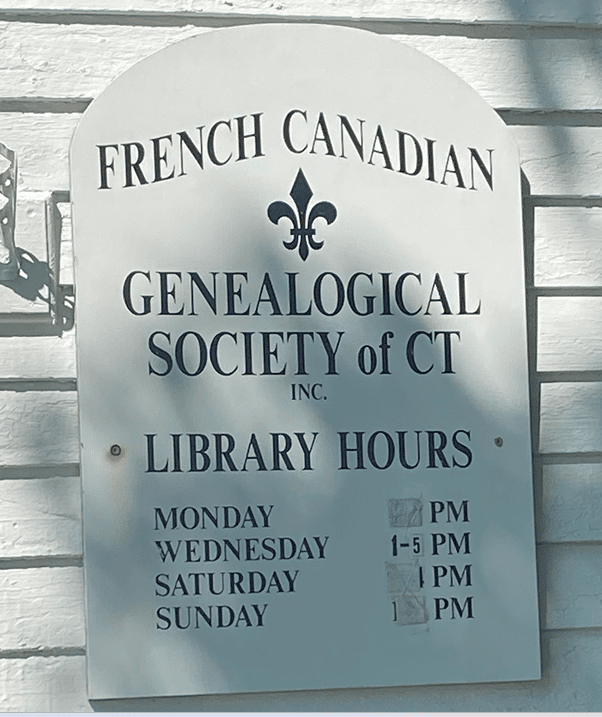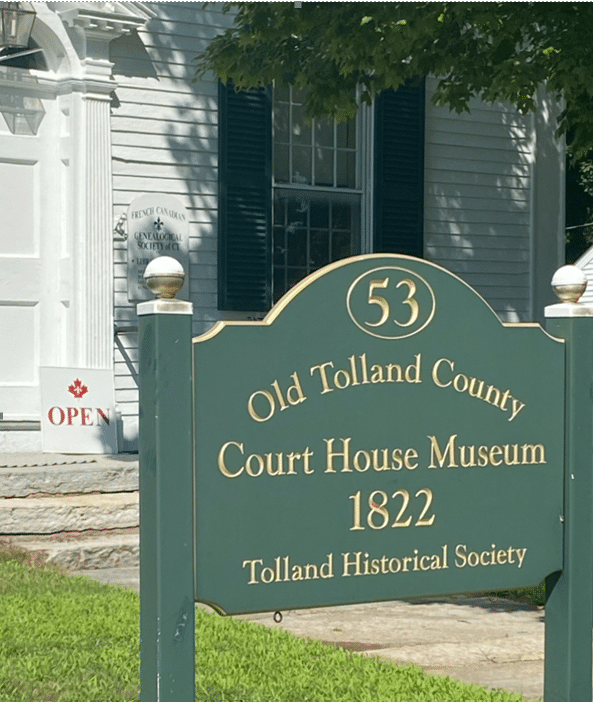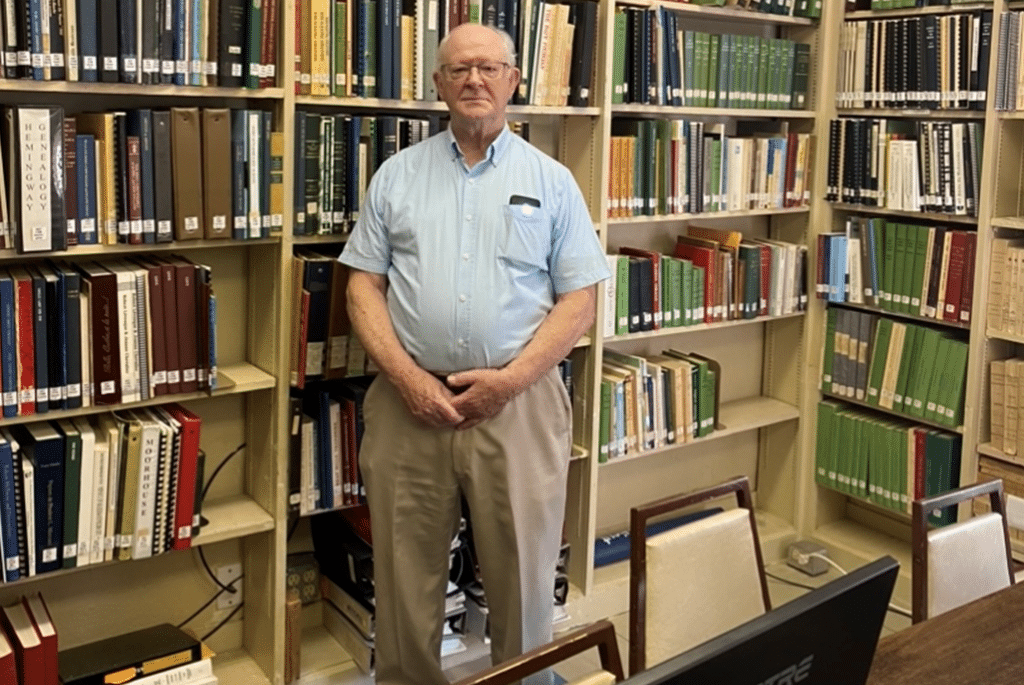Allô! Find Your French-Canadian Ancestry
 3
3Oct

(The opening hours for the French-Canadian Genealogical Society of Connecticut)[1]
Between 1840 and 1930 it is estimated that 900,000 French-Canadians came to the United States, and in particular to New England.[2] Life was difficult in Québec. Opportunities and land were more and more scarce for the rising generation. The promise of employment in the textile and lumber mills built along the rivers of New York and New England led many French-Canadians to pull up stakes in Québec and try their luck in the United States. Proof of this diaspora is found in the local French-Canadian societies established throughout New England. Maine, New Hampshire, Vermont, Massachusetts, Rhode Island, and Connecticut all have some version of a French-Canadian society, preserving the memory, traditions, and heritage of the immigrants from the North.

In the bucolic town of Tolland, Connecticut, is the French-Canadian Genealogical Society of Connecticut [FCGSC]. The society’s library is located in the charming setting of the historic Tolland County courthouse building on the Tolland green. “This 1822 Courthouse replaced the original 1785 building, serving all civil and criminal courts in Tolland County until the 1890s…It has been called one of the five most architecturally important early civic buildings remaining in Connecticut.”[3] The day I visited the Society there was a local market on the town green and church services in the Congregational church next door. Paul Lajoie, President of the FCGSC, graciously agreed to open the library outside the usual hours and show me the collections they held.

(Paul Lajoie, President of the French-Canadian Genealogical Society of Connecticut.)
French-Canadian Genealogical Society of Connecticut’s Library Holdings
The various collections are housed on shelves that are well marked and easily accessible surrounding tables and chairs available for members and patrons. The parish registers for the province of Quebec are ordered alphabetically; the years covered vary with each parish. The atmosphere is charged with the stories of the individuals and families whose lives are recorded on the pages of the parish registers and family histories, waiting to be discovered by a descendant.
One of the reasons for my visit to the FCGSC was to learn more about their holdings and discover how they were different from the American-French Genealogical Society, located roughly 50 miles away, in Woonsocket, Rhode Island. I reached out to Dr. Maryanne LeGrow, the head librarian of the Tolland society who provided interesting information that highlighted the resources of the French-Canadian Genealogical Society of Connecticut. Our discussion progressed as follows.[4]
Christine Jouffray: How are your holdings different from those of the American-French Genealogical Society in Woonsocket, Rhode Island?
Dr. LeGrow: It has been some years since I visited the Woonsocket library, but my guess would be that since both our collections concentrate on records concerning persons of French-Canadian extraction, we probably have many of the same standard sources - Tanguay, Jetté, Drouin, Loiselle, etc. Each of our sister organizations’ libraries (you may be aware that there are French-Canadian genealogical societies with libraries in Maine, Massachusetts, northern New York, Michigan, California, and a few other places as well) naturally also focuses on records concerning its local area. So, our library in Tolland probably has more information on Connecticut ancestry than other libraries do. This is especially true because the standard type of birth/baptism, marriage, and death/burial church records have not been published for Connecticut Catholic churches as they have been for Catholic parishes in other New England states. Consequently, in addition to the usual Connecticut sources – the Barbour Collection of pre-1870 town birth/marriage/death records, for instance - we have some home-grown databases that contain information not yet in print and therefore not likely to be available except from the offices of the town clerks of the individual towns. We are in the process of converting information from several of these to searchable databases that will be made available to our FCGSC members at the library and on our web site. These include:
- The Ashey Index: named for Theresa Ashey, one of our founding members, who in the late 20th century began compiling a card file of information extracted primarily from 19th and early 20th-century Connecticut town vital records. This has been expanded with additional information on Connecticut births, marriages and deaths, cemetery transcriptions, and other data published over the years in our Connecticut Maple Leaf journal as well as information from other local sources.
- Hartford Times obituary extracts and index
- Birth, Marriage, Death records, St. Catherine’s Church, Broad Brook, CT
- Hébert Acadian Collection: not available at our sister genealogical societies’ libraries, this is a file of thousands of handwritten 3”x 5” cards compiled by the late Rev. Hector Hébert, who researched and recorded records of Acadians of the 18th century diaspora and their descendants. I have been told that this collection, maintained by Rev. Hébert during his lifetime and donated to the FCGSC by his heirs, was filmed as part of the nucleus of materials that began the collection of the Centre d’Études Acadienne at the University of Moncton, New Brunswick. Much of the information in it is available nowhere else in the U.S.
I believe that we are one of the few genealogical libraries with a circulating collection of historical works in French and English on France; Canada, especially French Canada; the United States; Canadian politics and culture; and fiction in French and English by Canadian and U.S. writers.
We also have recently acquired a collection of genealogical and historical works on Ireland that will be helpful to those of combined Irish/French Canadian lineage.
Christine Jouffray: Do you have any unusual collections, books, or family histories?
Dr. LeGrow:
- Bouchard, Léonard. Morts tragiques et violentes au Canada, 17e et 18e siècles. Self-published. Canada, 1983. This is a two-volume work about tragic and violent deaths in 17th & 18th century Canada. Someone with roots in early New France might find an ancestor or two described here.
- The Drouin marriage indexes – both male and female indexes – are a startling compilation of virtually all Catholic marriages in Canada from the early 1600s to the 1930s. No other country, area or nationality can boast such a comprehensive catalogue. WorldCat lists only two libraries holding this index but I believe there are at least six or more sets in the United States, though possibly a few more.
- PRDH: Charbonneau, & Legare, Jacques, eds. Le répertoire des actes de baptême, mariage, sépulture, et des recensements du Québec ancient, known as the PRDH for the title of the original project that produced the data (Le Programme de Recherche en Démographie Historique): This is a compilation of civil and church records of baptisms, marriages, burials and census materials in Quebec. The PRDH is now available only online via subscription, but the FCGSC library holdings include all 47 originally published print volumes which cover from the beginning of records in New France to 1765, and a searchable computer database that spans the 17th century through 1799.
- Our family history collection includes both old and new published genealogies and one of a kind individually researched volumes that have been donated by their authors.
- We have over 1000 city directories, primarily from Connecticut and other New England states.”
Christine Jouffray: What is your vision for the future of the library?
Dr. LeGrow: My personal vision and hope is that our library, through the workshops and seminars it offers and the volunteers who staff it, will have a positive impact on the patrons we serve. I hope that through their family history research, the people who use our library will come to understand that we in the U.S. are all immigrants and the children of immigrants. I hope that through genealogy, people will recognize how much the struggles of our forebears have in common with those of today’s newcomers. I hope that by encouraging people to see how the past resembles the present, we can foster understanding, nurture acceptance, and encourage comity in a world that sorely needs it.
[End of Interview]
If your ancestry includes French-Canadian, it is very likely that your immigrant ancestor came through New England. Small French-Canadian societies dot New England keeping alive the heritage and memory of those immigrants and their lives built around the mill towns.
Price Genealogy would love to help you discover the rich heritage that is yours. A warm thanks to Dr. LeGrow and Paul Lajoie for their willingness to share their time, passion, and expertise.
Christine
[1] All photographs were taken by Christine Jouffray and I hold the copyright for them.
[2] Matt Russell, “French Canadian Migration,” Opportunities to Young French Canadians, LearnQuebec (https://secondaryhistory.learnquebec.ca/1840-1896/french-canadian-migration), About 900,000 French-Canadians came to the United States between 1840 and 1930, accessed 14 August 2024.
[3] The Tolland Historical Society, Museums and Much More Tolland, Connecticut, Leaflet, Tolland, Connecticut; Tolland Historical Society, undated.
[4] Dr. LeGrow’s responses were sent to me by email. Minor edits were made for diacritics and typos.
